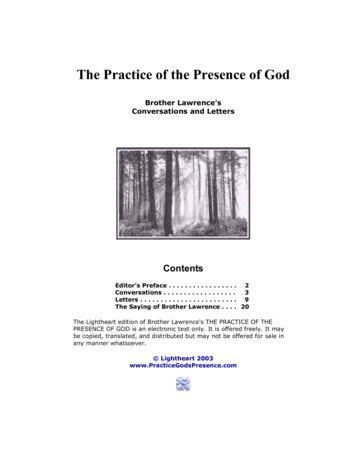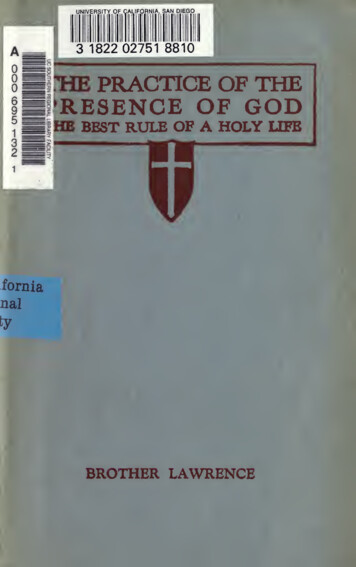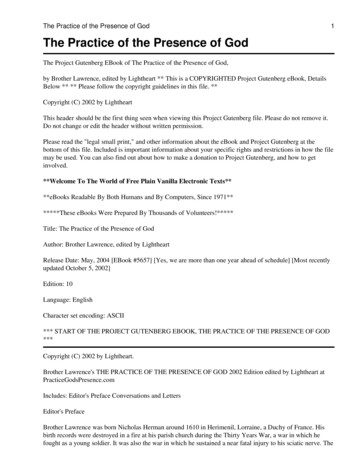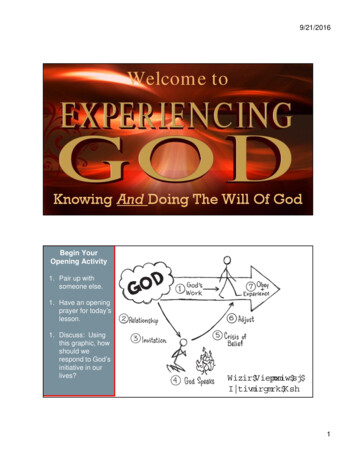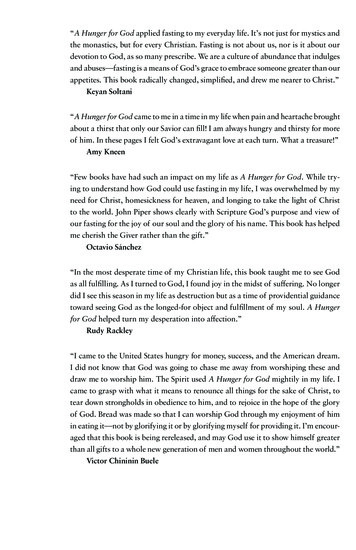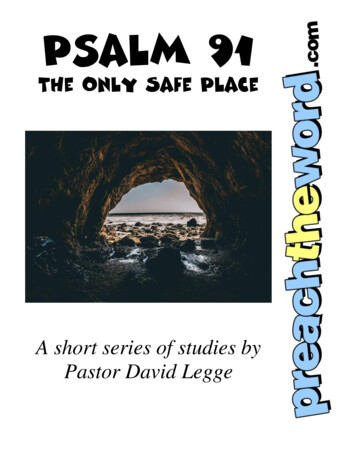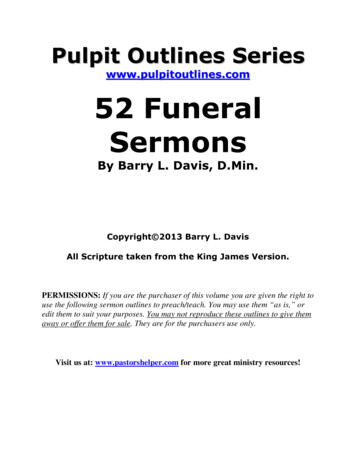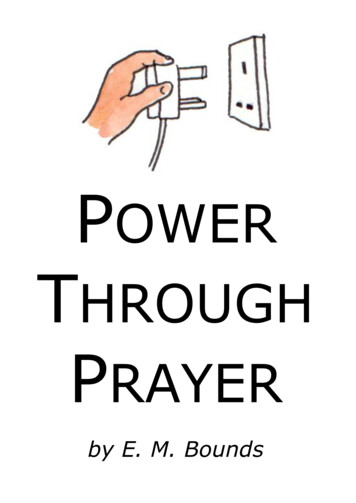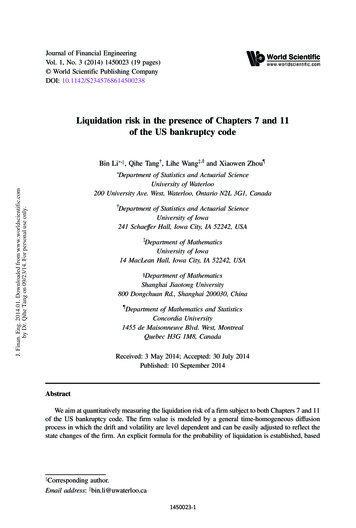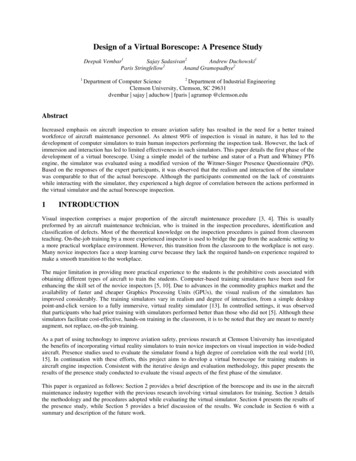
Transcription
The PresenceOf GodTracing the presence of Godthroughout history.A series by David Legge
THE PRESENCE OF GODDavid LeggeDavid Legge is a Christian evangelist, preacher and Bibleteacher. He served as Assistant Pastor at PortadownBaptist Church before receiving a call to the pastorate ofthe Iron Hall Assembly in Belfast, Northern Ireland. Heministered as pastor-teacher of the Iron Hall from 19982008, and now resides in Portadown with his wife Barbara,daughter Lydia and son Noah.Contents1.2.3.4.5.InInInInInThe Garden - 3The Tabernacle And Temple – 15Immanuel – 27Pentecost - 41The New Jerusalem - 53The audio for this series is available free of charge either on our website(www.preachtheword.com) or by request from info@preachtheword.comAll material by David Legge is copyrighted. However, these materials may be freely copied and distributed unaltered for thepurpose of study and teaching, so long as they are made available to others free of charge, and the copyright is included. Thisdoes not include hosting or broadcasting the materials on another website, however linking to the resources onpreachtheword.com is permitted. These materials may not, in any manner, be sold or used to solicit "donations" from others, normay they be included in anything you intend to copyright, sell, or offer for a fee. This copyright is exercised to keep thesematerials freely available to all.2
THE PRESENCE OF GODDavid LeggeThe Presence Of God - Chapter 1"In The Garden"Copyright 2010by David LeggeLet's bow again in another word of prayer, and I ask you to pray with me that theLord will bless us and really meet with us tonight. Father, we come again - wekeep coming, Lord, because we have great need. We long, Lord, to meet You likethe Psalmist, 'As the deer pants after the water brook, so pants my soul after Thee, OGod'. We long that we should appear before You in the temple, in Your meeting place- and so, Lord, we invoke the name of the Lord Jesus, Your meeting place with men,and we ask in His name, and on the merits of His precious blood, that You will meetwith us tonight. O God, we long for You, we just long for You, Lord - and we pray thatYou will not disappoint us tonight, but that You will come, and that, Lord, we will haveliberty in the Spirit to linger on in Your presence if You should come. We're trustingYou, and believing You, that You are going to come and bless us tonight and meetwith us. O God, we pray that You will break whatever bondage may be in each of ourlives that might prevent or clog up the communication from Yourself. Lord, we praythat we will do business with God tonight, and that we will be conscious that we arehearing the very voice of the Almighty. Lord, we pray that everyone gathered herewould know what it is for the Holy Spirit to come upon them. O God, we pray thatthey will be given fresh visions of Christ in all His glory. Lord, we long for that, welong to see Jesus, and we long to know what it is to commune with Him, to dine withHim, to sup with Him and He with us. So Lord, we open the door and we invite Him in- and, O Lord, we pray by the power of the Holy Spirit that His manifest presence willbe revealed to everyone here tonight. So Lord, hear us we pray, in Jesus' name weask it, Amen.I want you to turn with me please to Genesis chapter 2. If you received one of thecards about the meetings, you will know that we're going to look at 'The Presence ofGod' these nights, and we're going to trace it through the Bible effectively, fromGenesis to Revelation, some of the highlights of when the presence of God wasmanifest. Tonight we're looking at the presence of God 'In the Garden', and that is theGarden of Eden, of course. Now we're not going to do an initial reading just at thebeginning, but I want to do a general introduction first of all concerning 'The Presenceof God'.Before I do that, let me just say that there's not really much of a format to thesemeetings, I think, other than we have a hymn and a prayer and then launch into theWord - but what I felt led, at least, that we should do (I've spoken to Bertie about thisand he was actually led independently, and was going to mention this to me) is thatafter we deliver the message, that if you feel exercised - and there's no pressure onanyone, I know there are commitments, and people have to go home and do certainthings and you can't get out of those things - but if you should feel moved of God tojust wait in the presence of the Lord (and I believe the presence of the Lord is going3
THE PRESENCE OF GODDavid Leggeto be here after each of these messages in a very definite sense, we will be consciousof that), if you want to linger on, and certainly that's what I like to do when Godshows up, is to linger on in His presence and enjoy that, and allow the Holy Spirit tominister to my heart and life and see what He's going to do. Well, you're at liberty todo that - and, in fact, we would encourage you to do that - don't feel under pressure,but do wait behind if you can.Now there is more written in Scripture about God's desire to dwell with His peoplethan there is about man's desire to be with God. Let me repeat that: there is morewritten in Scripture about God's desire to dwell with His people than there is aboutman's desire to be with God - and that is profound when you consider the whole ofScripture. The great passion of God's heart, as He has revealed it to us from Genesisto Revelation, is to dwell in the midst of His people - not just to dwell, but to have amanifest presence among His people. Now that has always been His heart's passion, itis presently His heart's desire, and it always will be into the eternals: to dwell with Hispeople, but to manifest, to manifest His revealed presence among them. This is apredominant theme from Genesis to Revelation, and that's why I've taken theheadings that I have this week: 'The Presence of God in the Garden'; 'The Presence ofGod in the Tabernacle and the Temple'; and this is the pinnacle of God's revelation ofHimself 'The Presence of God in Immanuel', God With Us; 'The Presence of God inPentecost', or alternatively in the Holy Spirit and His work, His person, and Hisministries; and then Friday night, God willing, we're going to look at His manifestpresence 'In the New Jerusalem', in the eternal state. All of that, I suppose each ofthem anyway, are just examples of how generally this is the gamut and weight of themessage of the Bible: God wants to dwell with people, and He wants to visibly dwellwith them.Now, if that is the predominant theme of the word of God, surely then it follows thatthis must and ought to be the pre-eminent focus of our personal Christian experience?God's presence, and God's manifest presence - to know the presence of God in ourpersonal lives. So let me ask you right at the outset of this series: how much of thepresence of God do you know? Or how much of the manifest presence of God do youknow? Now, some will say: 'Well, surely God is omnipresent?' - and you know whatthat means, don't you? He is all-present, He is everywhere present - and, of course,that is true. Psalm 139 is often used to prove that, and rightly so: 'Where can I gofrom Your Spirit? Or where can I flee from Your presence?', the Psalmist says, 'If Iascend into heaven, You are there; if I make my bed in hell, behold, You are there. IfI take the wings of the morning, and dwell in the uttermost parts of the sea, eventhere Your hand shall lead me, and Your right hand shall hold me'. You can't escapethe presence of God, He is everywhere - but if that is the case, and it is, surely thenthat applies to unbelievers as well as believers? Does it not? If He is beside us in Hisomnipresence, He is beside them wherever they may be tonight in all sorts of places,even immoral places, God must be there in the same sense as He is with us in Hisomnipresence - but here's the great question: do they know His presence? Of coursethey don't.Then some will say: 'Well, there's the omnipresence of God, and then there is the4
THE PRESENCE OF GODDavid Leggepresence of Christ within His church'. There is the oft quoted verse in Matthew chapter18 and verse 20: 'Where two or three are gathered together', Jesus said, 'There am Iin the midst' - and it's in the context of where the Lord was talking about churchdiscipline, but nevertheless I think there is a broader principle there that the LordJesus is the sole and only Head of the church, and when we gather together as achurch we gather to Him, unto His name and His presence in the midst. So Christ ispresent wherever two or three believers are gathered - He is there - and yet, thoughwe believe that He has fulfilled His promise, yet we read in the book of Revelation of achurch called Laodicea, and we read that it was His church, 'to the seven churches',it's called a church, Christ is addressing it as His church, as the Head of the church, asthe Judge-Priest moving among the candlesticks of His churches, His local assembliesin Asia Minor - and yet Christ's presence, in some form, is shut out of that church. So,it has to be the case that Christ's promise is fulfilled - where two or three aregathered together there He is in the midst - but there is another sense in which thepresence of Christ, manifest, revealed in power, was shut outside; and that's why Hesaid: 'Behold, I stand at the door, and knock: if any man hear my voice, and open thedoor, I will come in to him, and will sup with him', or dine with him, 'and he with me'.They were not enjoying the full extent of God's intent that we should know in thepresence of the Lord Jesus Christ. In fact, and we'll not look at this passage in anydetail, you know that He threatened to spew Laodicea out of His mouth because theywere neither hot nor cold, but they were lukewarm. Yet He hasn't, at this moment,spewed them out of His mouth yet; and yet Christ is still outside the door. He hadn'tspewed them out, but they had shut Him out.Now, how then are we to understand the presence of God? Well, let me compare itwith the work of the Holy Spirit for a moment. When you're born-again you receivethe Holy Spirit as a gift, you can't be born-again without the Holy Spirit and receivingHim as a gift. Romans 8 verse 9 says: 'Now if anyone does not have the Spirit ofChrist, he is not His' - and that, in a sense, is a bit like the omnipresence of God, orindeed the presence of Christ in the church. What I mean by that is: when we're bornagain the Holy Spirit takes up residence in our lives, He is there, He is resident. Butthat is not the self-same thing as having the whole character of the Holy Spiritmanifest in our lives, and indeed His holy persuasion in our everyday experience,which the New Testament in Ephesians 5 verse 18 speaks of as 'the fullness of theHoly Spirit', where the Holy Spirit becomes President of our lives. So when we'resaved He becomes resident, He's there; but when we're filled with the Holy Spirit, Hebecomes President, He's in control - in other words, we are aware of His all-pervadingpresence in our lives, and other people become aware of that as well. Now that is verysimilar to what I'm talking about: there is the omnipresence of God, we know He iseverywhere, and He is everywhere even adjacent to unbelievers this very evening,but they are not knowledgeable of it, they are not in the experience of it. We know Hehas promised to be in the midst of His church as the Head, and even operative in deadchurches, pruning them - and yet what we are speaking of here is a personal andconscious knowledge of God's presence. Let me go further to say: even an intenseexperiential knowledge of God's presence over and above the mere acceptance offacts.5
THE PRESENCE OF GODDavid LeggeEvangelicalism is plagued, particularly conservative fundamental evangelicalism, isplagued with facts. It was Vance Havner who once said: 'Evangelicalism has all thefacts, but makes the wrong conclusions'. He is right in this regard: we believe in theomnipresence of God, we believe Christ is present where two or three are gathered inHis name, but we must not conclude that that means that we are experiencingeverything of the presence of God that God intended for us - because we're not! Weought not to be kidding ourselves that we are, irrespective of what our theology maytell us!Now sometimes this is a characteristic of revival: God manifests His presence verydefinitely. I have heard people express this in the record of revival: 'God waseverywhere' - what must that be like? Brian Edwards has a wonderful book, asynopsis of revival, and it's entitled 'Revival: A People Saturated With God' - that'sreally what we're hitting at tonight. So you may call this 'The Revival Presence ofGod', but that's not really where I want to go because my emphasis tonight and inthese meetings is not just something that happens like a flash in the pan when thereis a great awakening or revival of God's people, but I would rather call this presenceof God 'His Abiding Presence'. Someone once said, 'In revival God comes down, butwe want a God who stays' - I think that's a profound statement. It's not that wedespise what God does in revival, but the great blessing that we ought to have in oureveryday - what ought to be a normal Christian experience - is the abiding presenceof God with us, and I mean by that a conscious, perceived sense of God that must bepractised and has to be preserved, and I believe it is one of the blessings of what Johnspeaks of in 1 John as 'fellowship', and what John speaks of quoting our Lord JesusChrist in John 15, the gospel, 'abiding in Him', the vine.I hope I'm narrowing this down for you, and you're understanding now what we'regetting at when we're speaking of, in these meetings, the presence of God. But let mego a bit further and say to you that this is more than just knowing God. Let meillustrate it to you like this: imagine you have a friend from childhood, you've knownthem all your life up to now, and one day you're in the centre of Moy, or Armagh, orPortadown, or wherever. It's a stormy day, the wind is blowing and there is blindingrain, and you're all wrapped up with your hat, or your scarf, or your hood up, and youbump into that friend, walking along the street you bump into them - but you don'trecognise them. Now do you still know that friend? Yes, you still know them, you'vehad knowledge of them from your childhood, but the benefit of their presence haseluded you simply for the reason that you failed to recognise them. Do youunderstand? You know them, you've always known them, but that day you did notrecognise them. Now, you can know the presence of God, and you can even know it isthere, and you can even experience it intensely at certain times of your life - but whatwe're speaking of in this series of meetings is perceiving God's presence, and thesecret of perceiving God's presence is recognition. It's alright to understand what it isintellectually, and to have experienced it from time to time in your life, but if you'regoing to know that abiding presence of God every moment of every day, you're goingto have to recognise it - and I would vouch to say that most believers today don'trecognise the presence of God. One of the reasons why I know this is: whenever I, attimes, move about, and God's presence comes, and I sense God's presence in a6
THE PRESENCE OF GODDavid Leggemeeting, people just get up at times and blabber about the weather, the footballscores, the politics, the finances, everything - and they're not conscious one iota thatGod is there. That's why I like to encourage people to sit still at the end of meetings, Ifind myself more and more disposing of closing hymns, because sometimes theclosing hymn is the bird of the air that snatches away the seed of the word of God andthe presence of Christ.Recognition: do you recognise? Hebrews 11 verse 6 says: 'He that comes to God mustbelieve that He is', and you've got to believe that God is here, God is here! If you'regoing to experience an intense manifestation of His presence, you've got to first of allbelieve He's here - then you'll be expecting it, then you'll be seeking to recognise it.Such perception of the presence of God comes, therefore, by faith: 'He that comes toGod must believe that He is, and is the rewarder of those who diligently seek Him'.Faith is the evidence of things not seen. We can't see Him, but we must have faith. Itsays in that same chapter, Hebrews 11 and verse 27, of Moses that 'he endured asseeing Him who is invisible'. Are you getting it? God is omnipresent, Christ is therewhere two or three are gathered in His name, there is a sense of the revival presenceof God that comes at very special times, but what we are speaking of is the abidingpresence of God and Christ that we can know moment by moment, and it is almosttangible by faith when we recognise God in the midst of the church and in oureveryday lives and we seek Him.Now, the first record of man experiencing the Divine presence is in the Garden ofEden, Genesis chapter 2 and chapter 3. In verse 8, and I'll not be reading a wholelong reading, we'll just be jumping in from place to place, in verse 8 we read thesewords: 'The LORD God planted a garden eastward in Eden; and there he put the manwhom he had formed'. Now, it seems that there was a special Garden in the vicinity ofa place called Eden, not just Eden itself but a locality called Eden, and in Edensomewhere there is a garden. In Ezekiel 28 we read that Eden is the garden of God,so that simply means that this is a garden made by God for man - Adam. Now there ismuch speculation about the geographical location of where Eden was, but of muchgreater importance is the meaning - what does 'Eden' signify? 'Eden' may be relatedto a Hebrew verb which simply means 'to luxuriate', or 'to delight' - alright? Now thatgives us an idea of what Eden is all about. In fact, the Psalmist put it like this in Psalm16: 'You will show me the path of life', and you remember there was a Tree of Life inEden, 'and in Your presence is fullness of joy; and at Your right hand are pleasuresforevermore'. If ever there was a definition of the garden that was in Eden, it is that:'to luxuriate', 'to delight' in God's presence.It actually stands parallel with a description of what is called 'The Garden of Jehovah'or 'Yahweh' in Isaiah 51 verse 3. You don't need to turn to it, I'll quote it to you: 'Forthe LORD will comfort Zion, He will comfort all her waste places; He will make herwilderness like Eden', and this is what it is to be like Eden, 'And her desert like thegarden of the LORD; Joy and gladness will be found in it, thanksgiving and the voiceof melody' - that's what Eden is like, 'Joy and gladness will be found in it,thanksgiving and the voice of melody'. Now it is obvious, right from the verybeginning of the record of God, that Eden, this garden idyllic paradise in the midst of7
THE PRESENCE OF GODDavid Leggethe locality of Eden, was a trysting place for God with man, for Adam to meet God. Itwas a personal and private retreat where Adam the first man, and Eve the firstwoman, could rendezvous with their Lord. It's no surprise, therefore, that the name isgiven perennially to it as 'Paradise'.Can I ask you before we go on any further: do you have a paradise? Do you have aretreat? Do you have a personal private rendezvous with the Lord? Do you have anEden? Do you know what it is to draw to the right hand of God and know fullness ofjoy and pleasures forevermore? Do you know what it is to go down the path of life?Do you know what it is to have joy and gladness, thanksgiving and the voice ofmelody? That's what God intended from the very beginning.In chapter 3 of Genesis we're given a more intimate indication of how this fellowshipmay have developed. If you look at verse 8 of chapter 3 this time - and of course thisis after the fall, but nevertheless it gives us a clue or two into the relationship withGod - it says in verse 8: 'And they heard the sound of the LORD God walking in thegarden in the cool of the day, and Adam and his wife hid themselves from thepresence of the LORD God among the trees of the garden'. Now this tells us a little bitof how this fellowship with God developed between the first man and the first woman.It appears from verse 8 that they heard God approaching - that's what it says: 'theyheard the sound', or the voice, 'of the LORD God walking in the garden'. Theimplication is that when they heard God approaching their direction they instinctivelyknew that God wanted to be with them. That is the way it was from the verybeginning: God approaching them - and we have got this concept, don't we, rightly orwrongly, of us always coming to God? Here it is: God was coming to them continually.They would hear, if it was, His footsteps, and they would know: God wants to meet.Now, of course, they had sinned now - and it's very interesting to me, and I only sawthis earlier today, look where they hid themselves. At the end of verse 8 it says thatthey hid themselves 'among the trees of the garden'. So it appears that when theyheard God approaching, they used the provisions of God that He had given them inthe garden to hide themselves from the presence of God. Now think about that for amoment: in Eden, the trysting place for private and personal intercession andcommunion with the Almighty, the gifts that He had given them to feed them andsustain them, they actually use those good gifts, perfect gifts, to hide themselvesfrom the presence of God. I can tell you: that's what a lot of Christians are doingtoday! They're using church as a substitute for experiencing the abiding presence ofGod. They're using their doctrine - some of them right, some of them not so right, butit doesn't matter - substituting with doctrine a real living presence of God in theirlives. You can see this in many people who have hobbyhorses, doctrinal hobbyhorses,it's all they ever talk about - it's substituting a living vital relationship with God in Hispresence.It's fascinating to me that they actually used the things that God had given them. Ihear people talking about 'quiet time', and I don't talk about 'quiet time' any morebecause people have a conception that if you read a couple of chapters for the day,and you pray down your shopping list of prayer, that you've met with God. The Bible8
THE PRESENCE OF GODDavid Leggeis from God and prayer is from God, but you're using the gifts of God to hide yourselffrom the presence of God if that's the superficial level of your walk with God.Now, this verse 8 seems to indicate, even before the fall I believe, how the Lordfellowshipped with Adam and Eve. You can see that it's very natural, isn't it? 'Theyheard the sound of the LORD God walking in the garden in the cool of the day' - it'sclose fellowship. Leopold, the commentator, says: 'The almost casual way in whichthis is remarked indicates that this did not occur for the first time just then. There isextreme likelihood that the Almighty assumed some form analogous to the humanform, which was made in His image'. There's anthropomorphism here, that simplymeans references to human faculties concerning the Divine: He's walking, His voice isheard - and I believe that this is a pre-incarnate manifestation of the Lord JesusChrist, the Word of God, who was with God and was God from the very beginning.Now this is beautiful: Adam and Eve, in the Garden of Eden, in this private personaltrysting place of joy, gladness, fellowship and life, walked with the pre-incarnateChrist - and yet now we find them hiding from His presence.It's 'the cool of the day' - in the margin of your reference Bible it might show you thatthat simply means 'the breeze of the day'. From Hebrew geography and culture, wehazard a guess that this is probably late afternoon in the day. I want you to thinkabout this, this is painting a picture: late afternoon, Adam has worked a day - there'snothing sinful in work, that was before the fall! - he had worked a full day's work, theblood is pumping through his veins, his muscles are smarting. He comes in and he sitsdown in his trysting place with God and, I hazard a guess, here late in the afternoonhe rests in God's presence - does he have a meal with God? There's a lot about usdining with God and dining with Christ, isn't there? That's fellowship, isn't it? I don'tknow, but it's a wonderful picture, isn't it? Certainly Adam knew what it was to say:'I come to the garden alone,And the voice I hear falling on my earThe Son of God discloses.He walks with me, and He talks with me,He tells me I am His own;And the joy we share as we tarry there,None other has ever known'.The presence of God in the garden. Here's something more we know, back to chapter2 and verse 9. There were many trees in the garden, chapter 2 and verse 9, 'out ofthe ground the LORD God made every tree grow that is pleasant to the sight and goodfor food' - there are two trees in particular that seemed important in God's originalcreation, 'The tree of life was also in the midst of the garden, and the tree of theknowledge of good and evil'. One tree of life, and the other of the knowledge of goodand evil. Now without getting bogged down in things that are not relevant to oursubject, let me just say this much: the message that God was sending out right at thebeginning - and there are great questions over the problem of evil, and why did Godput the knowledge of good and evil before Adam and Eve and all the rest, we're notgetting into that tonight, but I'll tell you this much - at the beginning, what God was9
THE PRESENCE OF GODDavid Leggegiving mankind was the choice between His presence and self. That's why these twotrees are in the garden: the choice between communion and intimacy with theGodhead, and there was a test in the Garden of Eden right at the very beginning God wanted man to choose freely Himself over self. Can I say to you: that is alwaysthe choice. Every day of our waking lives that is the choice. The test in the Garden ofEden has always been the test: will I be God's, or will I be my own? Please note alsothat the first sin was that very choice that was made in the presence of God, the firstsin was a choice made in the presence of God - and every decision that takes us outof God's presence is sin.Adam made this grave mistake, and can I say to you also that this trend was repeatedin his son's life, Cain. Look at chapter 4 verse 13: 'And Cain said to the LORD, 'Mypunishment is greater than I can bear! Surely You have driven me out this day fromthe face of the ground; I shall be hidden from Your face; I shall be a fugitive and avagabond on the earth, and it will happen that anyone who finds me will kill me''.Then verse 16, now look at this: 'Then Cain went out from the presence of the LORDand dwelt in the land of Nod', look where he sojourned, 'on the east of Eden'. Nowhere are two lessons, very simple: one, we must make the choice to be in God'spresence - is that the choice you're making? Two, it will be a choice of disobediencethat will take you out of God's presence. It's very simple, isn't it, but profound? Everyday of your life, every moment of every day of your life, you make a choice to be inGod's abiding presence or outside it - and that will determine how much of God'smanifest presence you're experiencing. Equally so, it will be a choice of disobediencethat will take you out of God's presence. Look at verse 15 of chapter 2 for a moment,with the choice, and this is a choice, there is great responsibility - verse 15 of chapter2, now this is before the fall: 'The LORD God took the man and put him in the gardenof Eden to tend it', to dress it, to cultivate it, 'and keep it' - that's simply what 'dressit' means, to tend it, to cultivate it and keep it. Now we, when we commune with God,are in a gracious, merciful relationship - and it is a free gift, but it's got to becultivated, it's got to be worked at. So this garden - this is before the fall - when Godgave him this trysting place, he had to work at it, he had to keep it.So, with the choice to be in God's presence, there is a responsibility - but somethingelse: Eden was not just a responsibility and a privilege, but it was something thatbenefited others. If you look at verse 10 of chapter 2, out of this communion with Godwe see blessing flowing, benefiting others - verse 10 of chapter 2: 'Now a river wentout of Eden to water the garden, and from there it parted and became fourriverheads'. Do you see it? A river flowing from the midst of Eden, and the picture isthat outflowing this trysting relationship and communion of God with mankind came alife-giving, a fertilising river that blessed the whole of creation. Now that's literal, butit's also a spiritual picture of what the Psalmist said in Psalm 46: 'There is a riverwhose streams shall make glad the city of God, the holy place of the tabernacle of theMost High'. We'll see this on Friday as you go to Revelation 22 and verse 1, and we goto the New Jerusalem, John was shown 'a pure river of water of life, as crystal,proceeding from the throne of God and of the Lamb'. I'll tell you better than that:now, presently, in the life of the believer, we are to know rivers of blessing outflowingfrom our inner being. Jesus said in John 7: 'On the last day, that great day of the10
THE PRESENCE OF GODDavid Leggefeast, Jesus stood and cried out, saying, 'If anyone thirsts, let him come to Me anddrink. He who believes in Me, as the Scripture has said, out of his heart will flow riversof living water''.You see, there are great blessings - this is basic stuff, really basic stuff: God made usto meet with Him, God's desire has always been to dwell in the midst of His people, agreater desire than we have ever had to be in His presence. When we are with Him,it's a responsibility, you've got to work at it, it's a choice that's made every day andevery moment of every day to abide in His presence, in a mil
God in the Tabernacle and the Temple'; and this is the pinnacle of God's revelation of Himself 'The Presence of God in Immanuel', God With Us; 'The Presence of God in Pentecost', or alternatively in the Holy Spirit and His work, His person, and His ministries; and then Friday night, God willing, we're going
